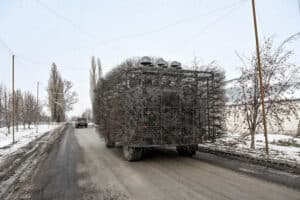South Africa may face secondary sanctions and intense scrutiny from foreign financial markets.

The South African Reserve Bank (Sarb) has warned the country’s so-called ‘neutral’ stance on Russia’s invasion of Ukraine will have ramifications for SA’s financial standing in the global markets.
Reserve Bank governor Lesetja Kganyago appeared before Parliament’s Standing Committee on Public Accounts (Scopa) to present the Reserve Bank’s findings from its 2023 Financial Stability Review.
The Financial Stability Review aims to monitor and review any risks, including the nature and the extent of risks, against the strengths and weaknesses of the financial system.
Sarb noted the diplomatic fallout resulting from recent comments by US Ambassador Reuben Brigety, led to a sharp sell-off in the South African Rand and its worst-ever level against the US Dollar (USD), which traded at R19.51 on 12 May 2023.
ALSO READ: Ramaphosa names panel to investigate Lady R docking incident
SA participation in global financial system
“South Africa’s non-aligned stance in the war between Russia and Ukraine is increasingly being questioned,” said Kganyago.
He warned that confusion about the country’s stance might pose a future threat to South African financial institutions’ participation in the global financial system, which increases the likelihood of secondary sanctions being imposed.
“Should this risk materialise, the South African financial system will not be able to function if it cannot make international payments in USD. It could lead to a sudden stop to capital inflows and increased outflows.”
On 11 May, Brigety dropped a bombshell during a press conference, in which he told journalists that a Russian ship (Lady R) was loaded with ammunition and arms in when it docked in Cape Town last December.
ALSO READ: Greylist: What comes next in SA?
FATF greylisting
The report also pointed out that local financial institutions may also be subjected to more intensive scrutiny by foreign counterparts when considered alongside the Financial Action Task Force (FATF) greylisting and the country’s inability to prevent crippling bouts of load shedding.
FATF, the global money laundering and terrorist financing watchdog added South Africa to the list of countries it deems are not doing enough to combat illicit financial flows, including money laundering and terrorist funding.
In February, it placed South Africa in the same bracket as Syria, the Democratic Republic of Congo and South Sudan.
Kganyago said while Sarb had anticipated FATF’s greylisting, there was still a considerable risk to financial stability if South Africa remained on the list longer than two years.
SA has 24 months to clean up its act
Kgayango stressed that remedial actions to remedy the greylisting needed to bare fruit in time for the next FATF assessment in 2025.
When questioned about the progress of said remedial actions, Kganyago was reluctant to weigh in, saying Sarb ‘preferred to stick in its own lane’.
“Our main focus at the moment, together with the government, is to get South Africa off the greylisting; it is what is consuming our time.”
Kganyago urged Scopa members to consult all government departments involved in greylisting remedial actions to report on progress made.
“We have set ourselves a period of 24 months, which has also been communicated to the markets, so the markets will press us on that basis.
“Should they think there is another slippage, what you may then see is that the cost of borrowing for South Africa will go up, the country’s risk premiums will go up, and it will lead to those kinds of complications,” said Kganyago.
Support Local Journalism
Add The Citizen as a Preferred Source on Google and follow us on Google News to see more of our trusted reporting in Google News and Top Stories.






